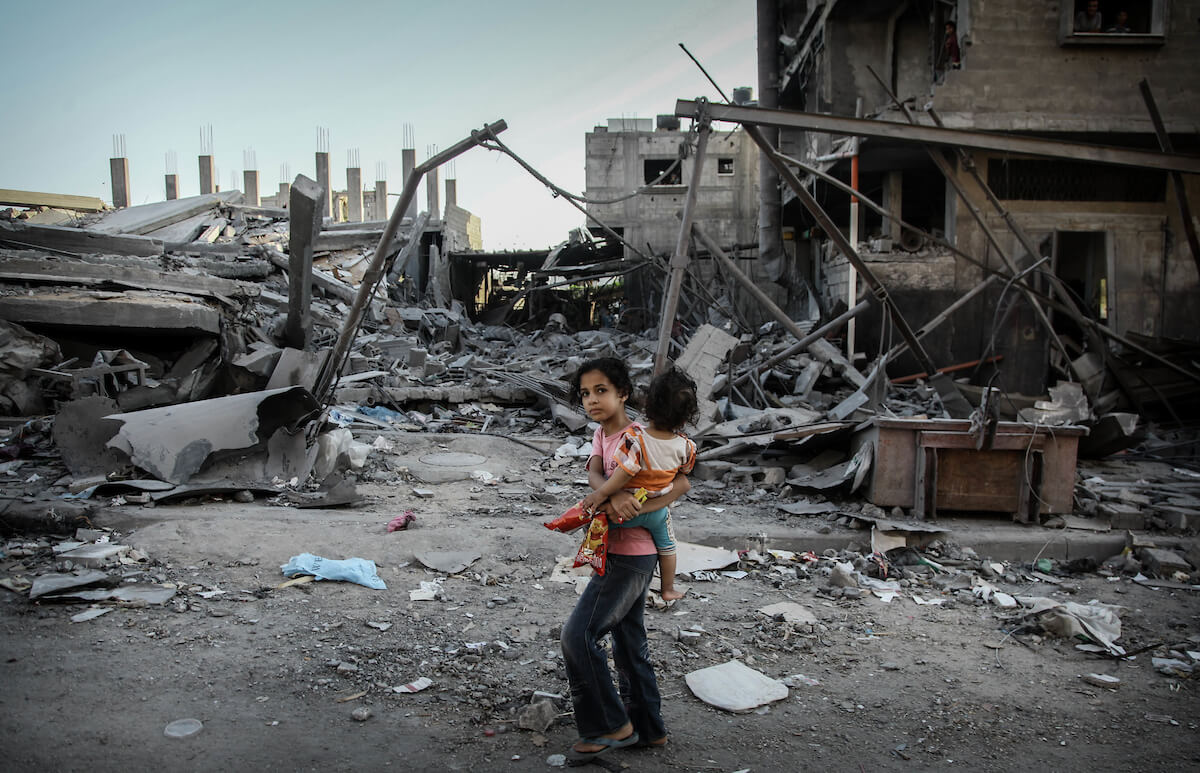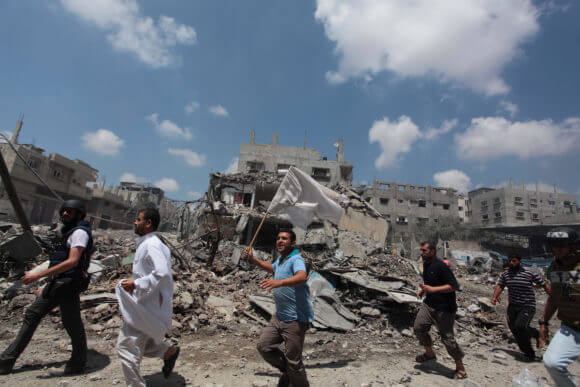Five years on, a reporter from Gaza remembers the 2014 war
Hamza Abu Al-Tarabeesh on July 30, 2019 2 Comments

Palestinians flee with their belongings from the Shejaiya neighborhood of the Gaza Strip, on August 19, 2014. (Photo: Ezz al-Zanoun/APA Images)
It’s been five years since the last war in Gaza, yet at times I feel like it was yesterday. I walk around with memories on loop inside my head. Sharp sounds give me flashbacks. Car backfires, popped tires, drones overhead, surged outlets all make me shudder.
My first experience of war-like conditions was in 2004 when I was 13. Israeli forces entered Jabalia refugee camp in northern Gaza where I lived for a two week operation during the second intifada that left 130 Palestinians and one Israeli dead. One day during that period a journalist stopped me on the street in my neighborhood and requested a short interview.
I was nervous and shy, but I agreed. The journalist was American and another man translated what he said to me to Arabic. I remember two of their questions: “Does your father let you go to the area where there are clashes?” and the second question was “what do you want to do when you grow up?”
To the first question I gave a terse answer. No, I was not allowed to go to the clashes. To the second, I gave a detailed answer.
“I want to be a famous football player, I’m a playmaker like the French player Zinedine Zidane and I want to be like him.”
Everyone smiled at my answer and the translator gave me a bottle of juice, before I ran home to tell my mother that I was just interviewed by a foreign journalist and may become famous.
Days and the years passed. I did not expect to become a journalist, nor did I expect to stop playing football which had consumed most of my spare time in childhood. Now I only watch football.
A week before 2014 World Cup started my cousin came from Turkey after he finished college there. He gifted me a shirt of Germany’s team, therefore we decided to cheer on the German together even though I was a committed lifelong Brazil fan.
When football games ended, we started our regular follow-up of watching clips of the best plays. After three weeks, on July 8, 2014, the Gaza Strip entered a third war with Israel in the span of six years. At the time, I was working as a cub reporter for the Hamas-affiliated newspaper Al Resalah Newspaper, although today I am a freelance reporter.
One the war began, the World Cup, which was supposed to be the highlight of my summer, became an afterthought.
The newspaper’s management had prepared an emergency plan and we adjusted our movements to and from the office with additional safety protocols accordingly.
It was my first time working in media under such circumstances; in the previous war I was a high school student. My work was led by Mohammed Daher who was then the media editor for the newspaper.
The first week of the war I worked as a field correspondent. Every time I went out, I took a small black bag that included my notebook, pen, a pack of cigarettes, and the Germany team shirt because I thought it was lucky.
The second week’s schedule was different. The team worked in rotations of three days on, one day off.
On the 13th day of the war when staff was with breaking news, I took a moment to watch a summary of the World Cup on YouTube. I wanted to see the German team’s victory. Daher then noticed what I was watching and said to me in a vinegar tone, “you’re not a child, you’re a journalist.”
I regretfully responded poorly and we had an argument.
On the morning of the next day, on July 20, 2014 the whole staff was in the office on time, except Daher.
The managing editor Mohammed Abu Qamar asked me to call Daher to see why he was late. I didn’t make the call immediately. Then I heard reports that 72 Palestinians were killed overnight in his neighborhood, Shejaiya in eastern Gaza.
For 30 minutes called and called but the line rang on and no one answered. At 4 p.m. I learned from a breaking television report that an errant shell from Israeli forces struck his house, collapsing the roof. Daher survived the blast but died days later in the hospital. Six more relatives including Daher’s one year old daughter and his parents were killed in the explosion. His wife Shamia, who was pregnant at the time, was the only survivor.
Immediately myself and others from the newspaper went to al-Shifa Hospital to visit Daher who was in coma.
The steps towards Daher’s bed were heavy and slow. I asked him to forgive me. I have no idea if he heard me or not. Daher succumbed to his injuries eleven days later on July 31, 2014.
I remember that the medical staff al-Shifa told me they were only able to remove the bodies of the Daher family five days after the house was destroyed because of extensive fighting in the neighborhood. Israeli forces had started a ground invasion into Gaza and Shejaiya was one of the most wrecked regions during the entire war. The whole neighborhood, really a town in and of itself, was ostensibly flattened in a few days time.

Palestinians flee with their belongings from the Shejaiya neighborhood in the Gaza Strip to the center of Gaza City to seek refugee at a United Nations school, on August 19, 2014. (Photo: Ezz al-Zanoun/APA Images)

Palestinians in the Shejaiya neighborhood wave a white flag as they flee to safety, on July 20, 2014. (Photo: Ashraf Amra/APA Images)
At then end of the war the United Nations found 1,523 Palestinian civilians, including 519 children were killed along with 67 Israeli soldiers and 7 civilians including a Thai national.
I wished I never shouted at Daher, I wished I never watched that football replay.
One of the most frightening moments for a journalist covering the 2014 war was riding in a car. We had to take cars to cover stories about the aftermath of a bombardment and these experiences were fraught with danger. The previous wars in Gaza taught us that everything moving is an Israeli target, even medical staff in an ambulance or journalists marked PRESS. Reporters usually ride in vehicles marked “TV” on the roof with electrical tape, but that hardly quelled the prevailing sense of peril.
For me, every time I get into the car heading to work on a feature or documenting an Israeli massacre, I tried to hide my fear from my colleague, photographer Khaled Tema, who used to accompany me. I bet that I saw the same hidden fear inside his eyes as well.
On August 4, 2014, after an unforgettable day for me, I returned to the office with Tema and he started to edit a photo story. At around 1 a.m., he received a phone call after which he stopped talking and requested to leave the office. Later, we heard that his younger brother was killed in a drone strike.
But at that time we did not know what had occurred and tried to reason with him to stay in the office because we feared that he could be killed in nearby air strikes. After many trials he was convinced to wait. The whole staff working that evening slept overnight in the office. In the early morning hours myself and other colleagues accompanied Tema to the hospital, specifically to the morgue.
We left Tema there to grieve with his family and returned to the office to continue our work. News moves fast during war and we are not granted time to process losses. After two hours, we were surprised to see Tema come into the office holding his camera. He said then: “There’s no time to grieve, we need to hurry in documenting Israeli crimes,” and he continued doing his work in silence.
If the first lesson I learned about being a war correspondent was from Mohammed Daher who was right that I should have focused on my work over, the second lesson I learned came from Tema’s reaction.
…
Ten days before the war’s end in mid-August, I was busy at work when one of my neighbors called to say that someone from the Israeli military called him and warned his house would be targeted in the coming hours. That soldier requested he inform other neighbors to evacuate their homes as the camp house are very close to each other. This was not an uncommon phenomenon during the war, that a Palestinian would receive a phone call on their mobile from the Israeli army notifying them of a coming air strike. The neighbor told me he had tried to reach my family to tell them to evacuate, but no one answered. We live in Jabalia refugee camp, one of the more dense areas in Gaza.
I jumped out of my seat and ran to the car with the driver for the newspaper. After a few minutes we were on my street.
I could see dozens of neighbors running. That’s what an evacuation looks like. I darted inside my house and screamed for my mother. In a frightened tone she said, “we’re here. Hurry Hamza.”
I found my family hiding in the bathroom. It’s the only place at our house insulated by cement. My mother and four sisters were huddled together. I turned off my phone and stayed with them in the bathroom. After an hour, we could hear neighbors return to their houses. No air strike had occurred.
While our house was not harmed during the war many others were. We didn’t have the official numbers at the time, but the panic around us was because we could destroyed neighborhoods and overcrowded shelters. At the end of the war the United Nations reported Israeli forces damaged 60,000 homes in Gaza, of which 20,000 were completely destroyed. An estimated one-third of the entire 2 million population in Gaza lived in a home that was damaged during the war.
While all this was going on I still had to work. Interviewing Palestinians who had lost family members was the most difficult for me. I was confused as to what was the most appropriate way of asking. I didn’t have a sense of timing. I often wondered were my questions harmful? That thought circulated in my head often. I was afraid of harming the families more.
I remember early on I was eager to cover the war, especially after my colleague was killed. The war was 51 days long and by the last week I was exhausted. I really wanted to stop working and sleep. It was summer and our office was hot. I was beyond fatigued.
One night, in the middle of the night three days before the war ended, Israeli forces bombed two high rises in Gaza City, one of which, the Italian Complex, was 300 yards from my bureau. The blast injured 25.
At the moment of impact the electricity cut, smoke and dust covered the office, and I heard shrapnel hitting the exterior. One of my colleagues started sobbing. I tried to open the door, but it was difficult because of the air pressure the missiles caused. After three trials, I opened it.
Despite how terrified we were at the time, now years later it sits in a place of dark humor. We process the trauma by joking about our reactions, especially the colleague who cried. I can see I’ve hardened in other ways. That Germany shirt I wouldn’t leave with, I think my mom ended up making kitchen rags out of it.
No comments:
Post a Comment